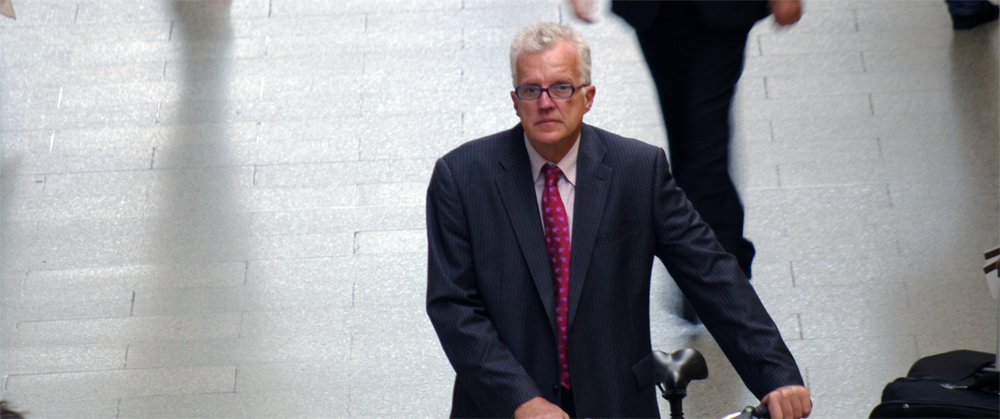There is something deeply perverse about the rail industry. While in a recession when customer numbers are falling, most companies would try to attract more users by, for example, reducing the price of the product or improving it in various ways.
The train operators seem to be doing the opposite, making train travel less pleasant in various ways. First, and most obviously, they are increasing non-regulated fares by amounts well above inflation and there are already predictions that since regulated fares will go down by 0.4 per cent in January, other fares will rise by large amounts to compensate. As an aside, it is extraordinary that far from responding to this enforced reduction by issuing a press release celebrating cheaper prices for its customers, the news was greeted by the Association of Train Operating Companies with total silence, thereby losing a marketing opportunity.
At a time when many people are in difficult economic circumstances, and the growth in passengers has come to a halt, some train operators, have surreptitiously cut back on the number of cheaper tickets while others have put up fares twice this year. Without even raising the wider issue as to whether increasing the cost of train travel makes sense in terms of the environment let alone UK plc, the train operators seem to be sacrificing their long term interests in order to make up shortfalls in their bottom lines.
Then there’s the question of barriers. Various operators, National Express and Stagecoach in particular, encouraged by the Department are installing barriers willy-nilly at stations around the country. There have been particularly fierce opposition at York, where they would put out of use a direct connection with the Museum installed only a few years ago but for the moment planning permission has been refused, and Sheffield, where the route through the station is used by local people. While barriers have a role to play in busy suburban stations, they are a major impediment to easy access to the platforms for long distance travellers with luggage and are deeply unpopular. Lord Adonis, the transport secretary, supports their efforts even though their argument that barriers boost revenue is disputed by several experts in the field.
Another aspect of the ‘customer interface’, as the marketing people call it, is also becoming harder: buying tickets. Ticket offices are closing to be replaced by machines which, while the technology is improving, still leave a lot to be desired particularly as the pricing system is so complicated that one needs advice on what to purchase. Train operator websites are, too, among the least user friendly that I have encountered. Partly this is a result of the complexity of the ticketing system, but also of poor design. The National Express website is specially difficult to navigate. Not only did it suggest to me tickets costing between £25 and £288 for a trip for three people to York, but it was only when I clicked on that ‘offer’ that I could then investigate the alternatives properly. (Why not just offer the cheapest alternative for each train?)
Then, most irritatingly, there is the question of announcements. Given that train travel is relatively expensive, often somewhat inconvenient and has constant competition from other modes of travel, surely the aim must be to provide an environment that is as pleasant and comfortable as possible. Yet, some operators seem to think that their ‘customers’ need a constant bombardment of repetitive, banal and at times downright stupid announcements that infantilise their listeners.
My personal bugbear is the safety announcement, suggesting passengers read the notices which are not only unfathomable but make train travel (one passenger death in seven years) seem far more dangerous than it is. At stations, too, the level of noise pollution has become almost intolerable, especially with the automated ones about ‘unattended baggage’ adding to warnings about feeding pigeons or slippery floors (this on a hot June day in Hull). Of course, as any psychologist will know, people will simply ignore such a constant level of background noise and thus any important messages may well get lost in the cacophony
The worst offender is South West Trains, where not only is there the full panoply of automated announcements but then the guards take it upon themselves to repeat much of what has already been said. On a trip from Poole to London, there must have been a dozen warnings about moving into the right carriage to exit at certain stations, and twice as many about ‘personal belongings’. The company replied to a recent complaint from the Tory MP David Willetts that it was only following EU rules about disability and other legislation.
This appears to be either mistaken or an over rigorous interpretation of the rules, as some other companies are much more restrained in the number of announcements. Travelling recently on Southern, operating next door to SWT, there was a minimal announcement about the next station (not ‘station stop’, a ridiculous tautology) as we left and approached each station, and that was about it. Nothing about taking ‘all’ your personal belongings – as if one travelled with one’s lifetime of possessions or about ‘for your own personal safety, read the safety notice’ or about travelling with the wrong ticket, slippery platforms or pigeon droppings.
Overall, there is a lack of thinking about what the nature of the ‘product’ of train travel or any consideration of what is likely to retain existing customers and attract new ones. The train operators have basked in the luxury of increasing passenger numbers, stimulated by a variety of external factors, for over a decade but in these harder times they should be giving more thought to making train travel a pleasant experience.
